This Religion Called Christianity 5
Mike Ervin
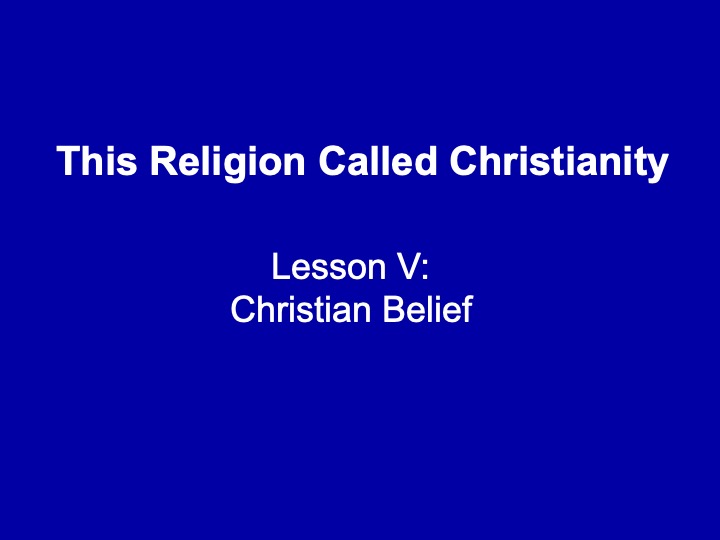
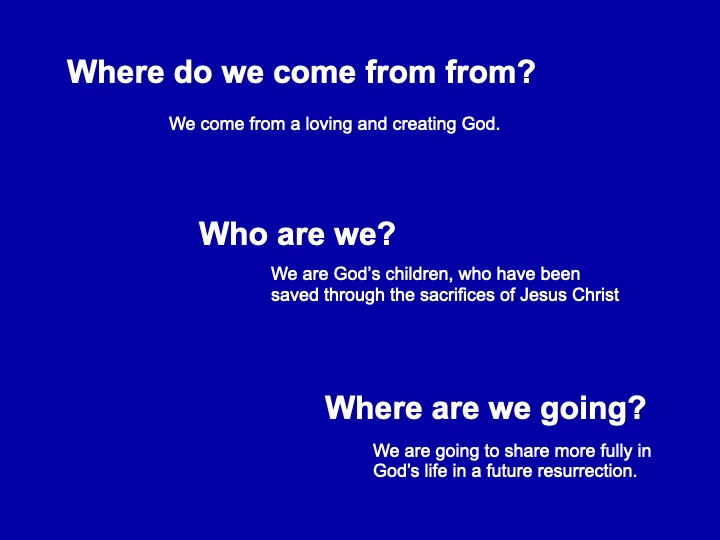
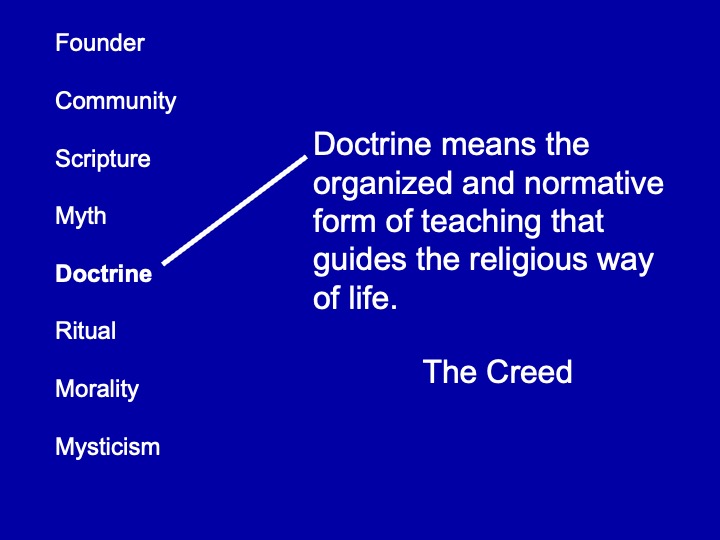
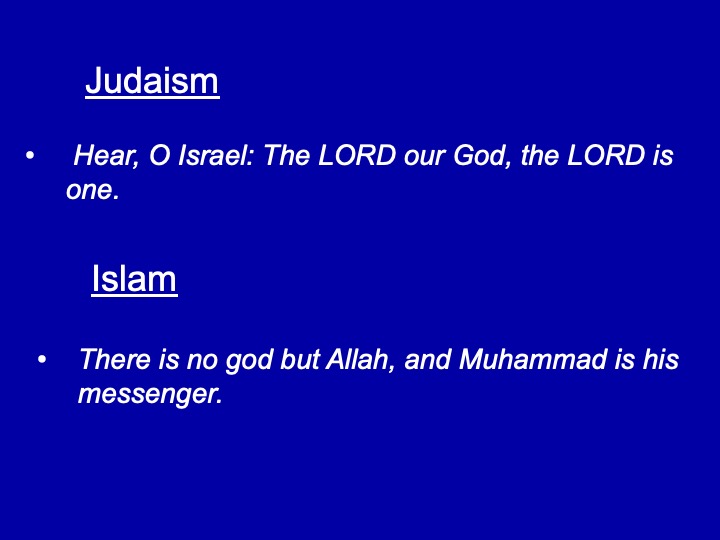
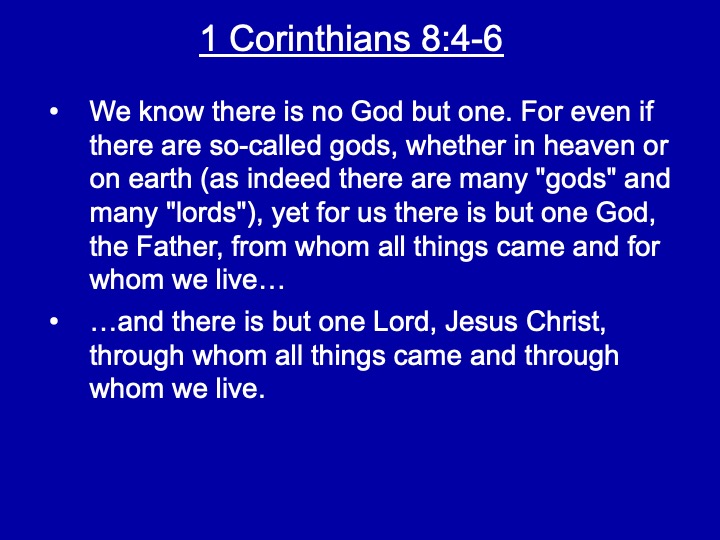
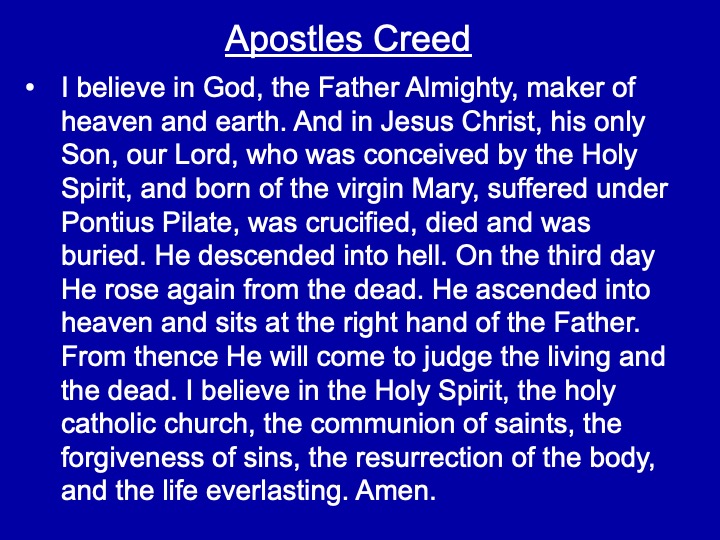
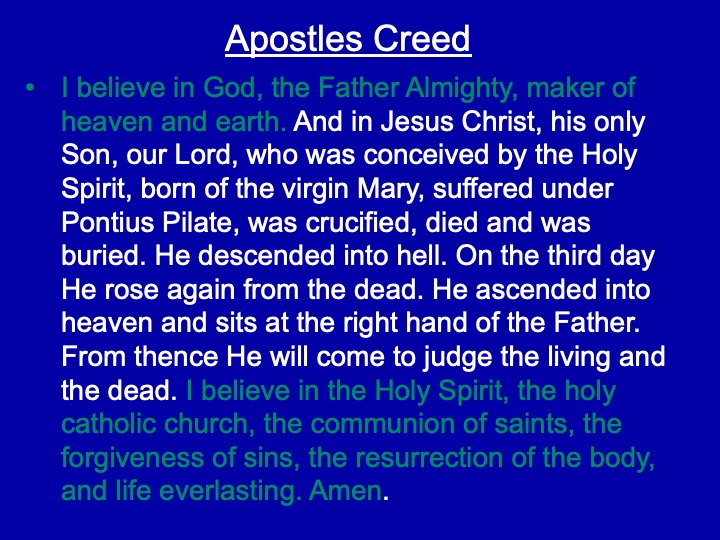
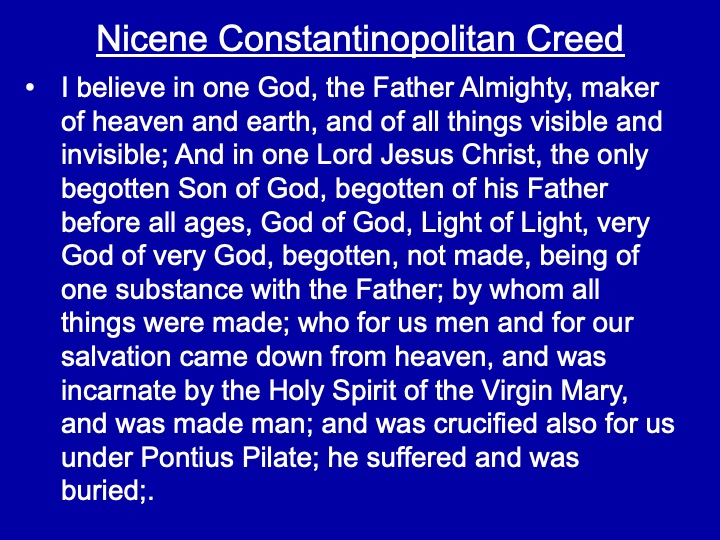
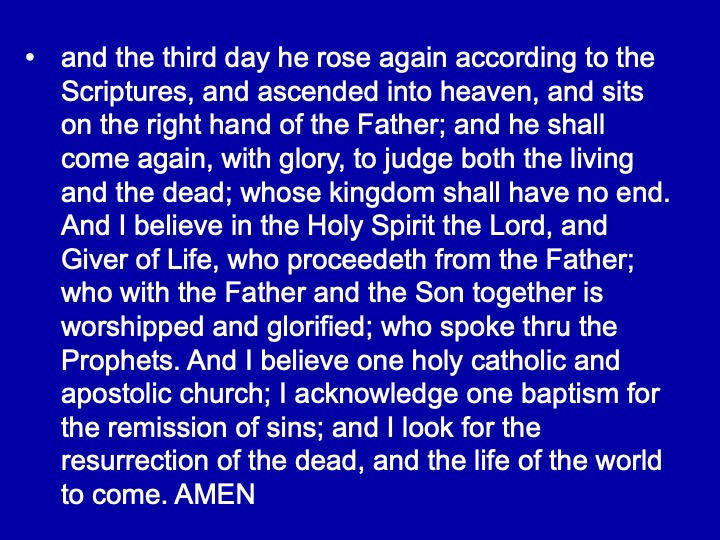
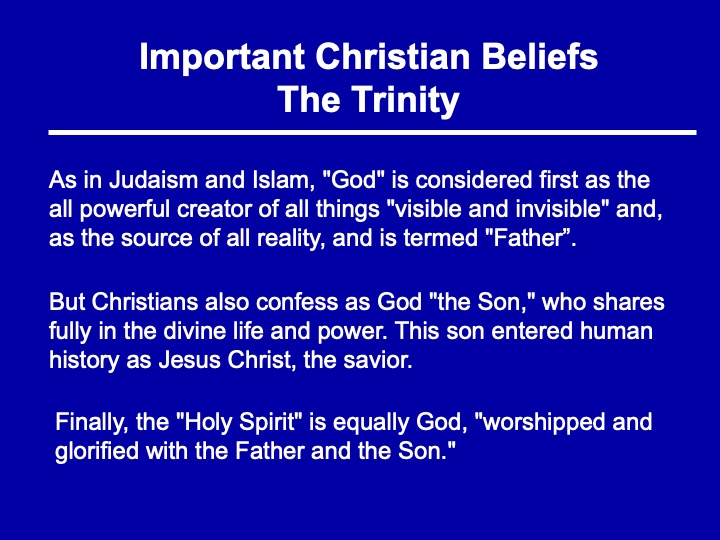
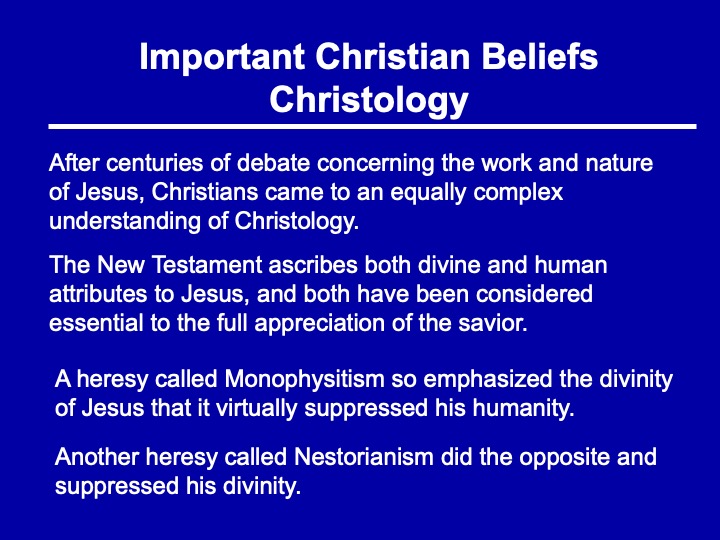
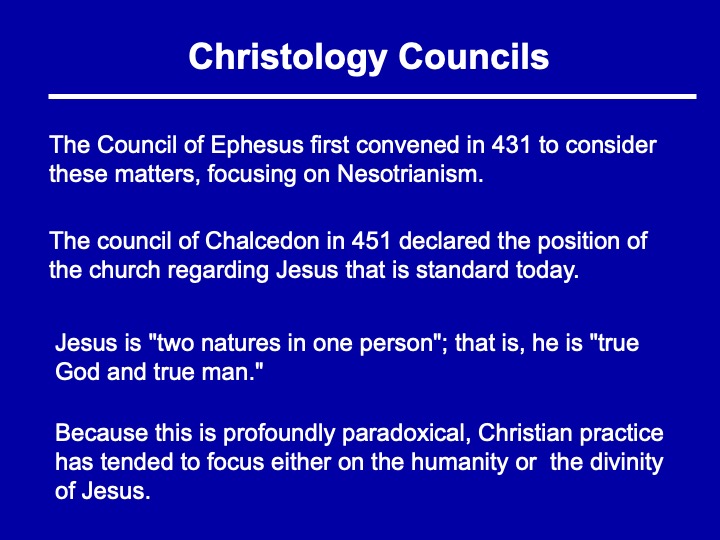
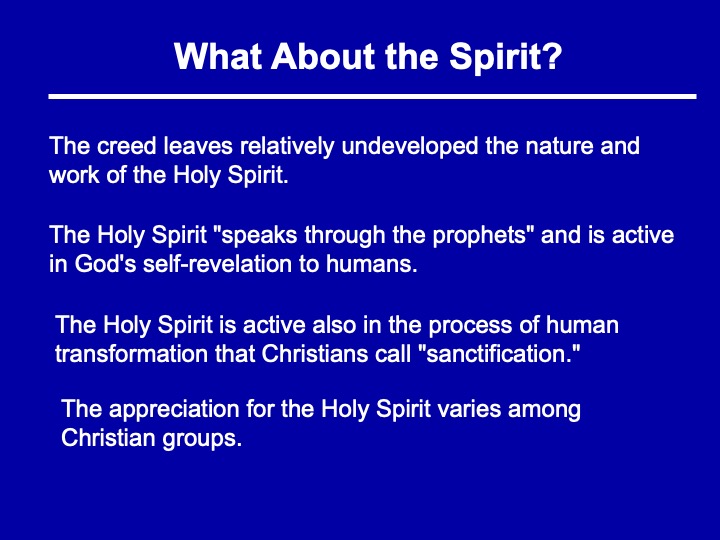
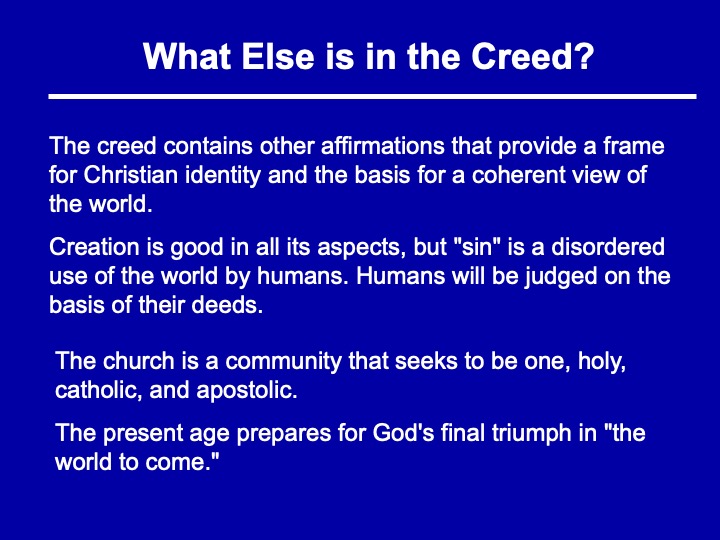

This Religion Called Christianity 5
Links
< Home Page > < This Religion Called Christianity >
Class Five - What Christians Believe
Scope: Belief, or doctrine, is more important to Christianity than to other religious traditions, such as Judaism or Islam, in part because of Christianity's origin as a sect within Judaism. The creed began as an instrument of initiation and witness, then developed as an instrument of self-definition in a tradition that experienced internal conflict from the beginning. This presentation sketches the origins and development of the creed, touches on its continuing controversial place in Christianity, then focuses on the central tenets of faith expressed by the 4th_century Nicene Constantinopolitan Creed. What does the classic Christian faith hold concerning God as creator, Jesus Christ as Son of God and savior, and the Holy Spirit as sanctifier? What does the creed understand as the essential marks of the church?
I. Belief, or doctrine, occupies an unusually central place in Christianity, compared to other religious traditions.
A. Some religions, including Judaism and Islam, place more emphasis on orthopraxy ("right practice") than on orthodoxy ("right opinion").
B. The Christian emphasis on belief is connected to its origins and early development.
1. Its beginnings as a Jewish sect required making a choice for Jesus as Messiah and Lord.
2. The experience of Jesus among followers gave rise to diverse understandings, requiring ever more elaborate statements of belief as a means of self-definition.
C. Christian belief is expressed formally by creeds and doctrines that have developed over time in response to internal conflict.
1. The rudimentary statements of belief in the New Testament developed into the Apostles' Creed.
2. The standard expression of faith for most Christians is the Nicene-Constantinopolitan Creed (325-381).
D. Although all Christians emphasize belief, no single creed conU11ands the assent of all Christians.
1. Some groups have developed creedal statements that reflect their particular perspectives (see the Westminster Confession).
2. Other groups reject the classic creeds but nevertheless retain certain convictions as a lens for reading scripture.
This Religion Called Christianity
Scope: Belief, or doctrine, is more important to Christianity than to other religious traditions, such as Judaism or Islam, in part because of Christianity's origin as a sect within Judaism. The creed began as an instrument of initiation and witness, then developed as an instrument of self-definition in a tradition that experienced internal conflict from the beginning. This presentation sketches the origins and development of the creed, touches on its continuing controversial place in Christianity, then focuses on the central tenets of faith expressed by the 4th_century Nicene Constantinopolitan Creed. What does the classic Christian faith hold concerning God as creator, Jesus Christ as Son of God and savior, and the Holy Spirit as sanctifier? What does the creed understand as the essential marks of the church?
I. Belief, or doctrine, occupies an unusually central place in Christianity, compared to other religious traditions.
A. Some religions, including Judaism and Islam, place more emphasis on orthopraxy ("right practice") than on orthodoxy ("right opinion").
B. The Christian emphasis on belief is connected to its origins and early development.
1. Its beginnings as a Jewish sect required making a choice for Jesus as Messiah and Lord.
2. The experience of Jesus among followers gave rise to diverse understandings, requiring ever more elaborate statements of belief as a means of self-definition.
C. Christian belief is expressed formally by creeds and doctrines that have developed over time in response to internal conflict.
1. The rudimentary statements of belief in the New Testament developed into the Apostles' Creed.
2. The standard expression of faith for most Christians is the Nicene-Constantinopolitan Creed (325-381).
D. Although all Christians emphasize belief, no single creed conU11ands the assent of all Christians.
1. Some groups have developed creedal statements that reflect their particular perspectives (see the Westminster Confession).
2. Other groups reject the classic creeds but nevertheless retain certain convictions as a lens for reading scripture.
II. Although Christianity is correctly called a monotheistic religion, its understanding of a triune God is complex.
A. As in JudaislT1 and Islam, "God" is considered first as the all powerful creator of all things "visible and invisible" and, as the source of all reality, is termed "Father."
B. But Christians also confess as God "the Son," who shares fully in the divine life and power. This son entered human history as Jesus Christ, the savior.
C. Finally, the "Holy Spirit" is equally God, "worshipped and glorified with the Father and the Son."
D. Christians consider that the way God is revealed through creation, salvation, and sanctification truly discloses the inner life of God as "three persons in one nature."
III. After centuries of debate concerning the work and nature of Jesus, Christians came to an equally complex understanding of Christo logy.
A. The New Testament ascribes both divine and human attributes to Jesus, and both have been considered essential to the full appreciation of the savior.
1. A heresy called Monophysitism so emphasized the divinity of Jesus that it virtually suppressed his humanity.
2. Another b.eles,:( c::~'\'kQ. Ne~t(w\m'\\~m 'c\'-\j)\\(\'s:yzx,\\ ':\'C'S'U'&' '& humanity to the extent that his divine nature seemed neglected.
B. The Council of Chalcedon (451) declared that the orthodox understanding of Jesus must recognize that he is "two natures in one person"; that is, he is "true God and true man."
C. Because the orthodox position is also profoundly paradoxical, Christian practice and piety have tended to focus either on the humanity or the divinity of Jesus.
IV. The creed leaves relatively undeveloped the nature and work of the Holy Spirit, and the appreciation for the Holy Spirit varies among Christian groups.
A. The Holy Spirit "speaks through the prophets" and is active in God's self-revelation to humans.
B. The Holy Spirit is active also in the process of human transformatiol1 that Christians call "sanctification."
V. The creed contains other affirmations that provide a frame for Christian identity and the basis for a coherent view of the world.
A. Creation is good in all its aspects, but "sin" is a disordered use of the world by humans. Humans will be judged on the basis of their deeds.
B. The church is a community that seeks to be one, holy, catholic, and apostolic.
C. The present age prepares for God's final triumph in "the world to come."
This Religion Called Christianity
II. Although Christianity is correctly called a monotheistic religion, its understanding of a triune God is complex.
A. As in JudaislT1 and Islam, "God" is considered first as the all powerful creator of all things "visible and invisible" and, as the source of all reality, is termed "Father."
B. But Christians also confess as God "the Son," who shares fully in the divine life and power. This son entered human history as Jesus Christ, the savior.
C. Finally, the "Holy Spirit" is equally God, "worshipped and glorified with the Father and the Son."
D. Christians consider that the way God is revealed through creation, salvation, and sanctification truly discloses the inner life of God as "three persons in one nature."
This Religion Called Christianity
III. After centuries of debate concerning the work and nature of Jesus, Christians came to an equally complex understanding of Christo logy.
A. The New Testament ascribes both divine and human attributes to Jesus, and both have been considered essential to the full appreciation of the savior.
1. A heresy called Monophysitism so emphasized the divinity of Jesus that it virtually suppressed his humanity.
2. Another b.eles,:( c::~'\'kQ. Ne~t(w\m'\\~m 'c\'-\j)\\(\'s:yzx,\\ ':\'C'S'U'&' '& humanity to the extent that his divine nature seemed neglected.
B. The Council of Chalcedon (451) declared that the orthodox understanding of Jesus must recognize that he is "two natures in one person"; that is, he is "true God and true man."
C. Because the orthodox position is also profoundly paradoxical, Christian practice and piety have tended to focus either on the humanity or 011 the divinity of Jesus.
This Religion Called Christianity
IV. The creed leaves relatively undeveloped the nature and work of the Holy Spirit, and the appreciation for the Holy Spirit varies among Christian groups.
A. The Holy Spirit "speaks through the prophets" and is active in God's self-revelation to humans.
B. The Holy Spirit is active also in the process of human transformatiol1 that Christians call "sanctification."
This Religion Called Christianity
V. The creed contains other affirmations that provide a frame for Christian identity and the basis for a coherent view of the world.
A. Creation is good in all its aspects, but "sin" is a disordered use of the world by humans. Humans will be judged on the basis of their deeds.
B. The church is a community that seeks to be one, holy, catholic, and apostolic.
C. The present age prepares for God's final triumph in "the world to come."